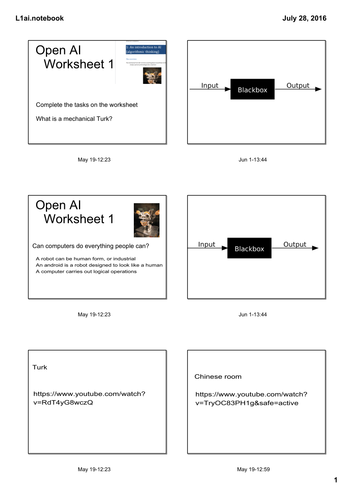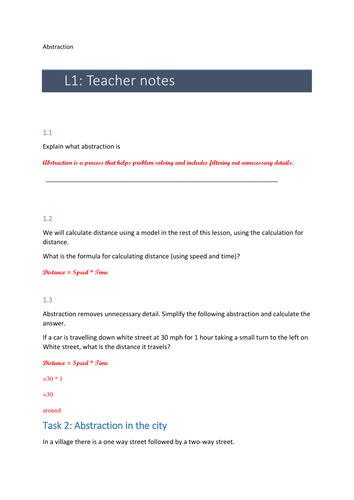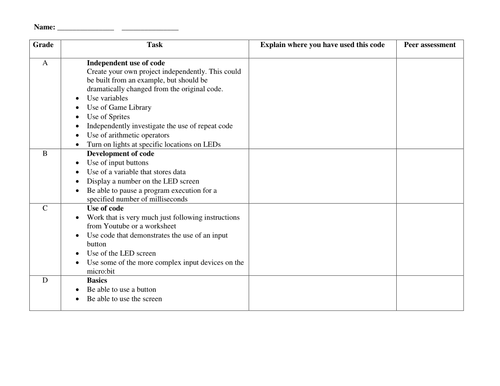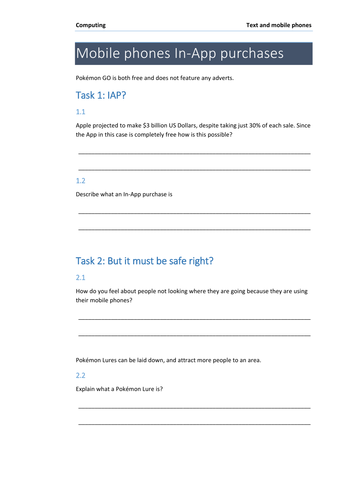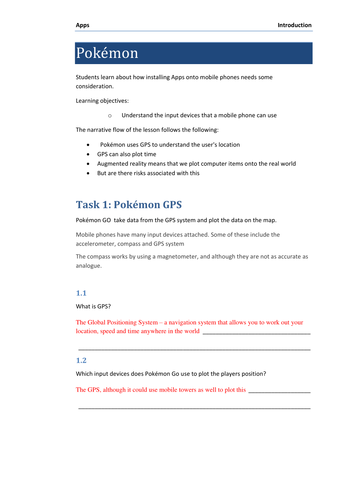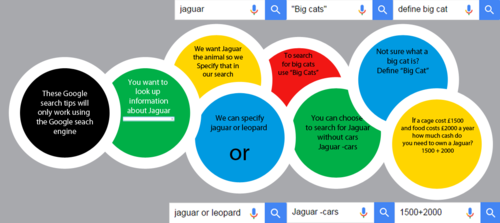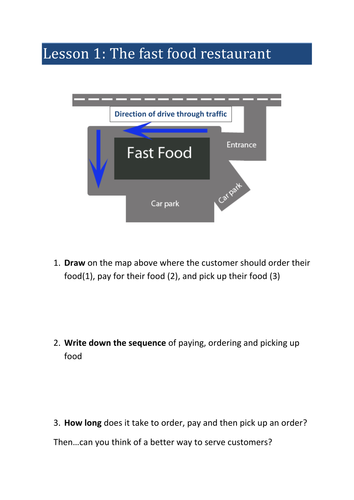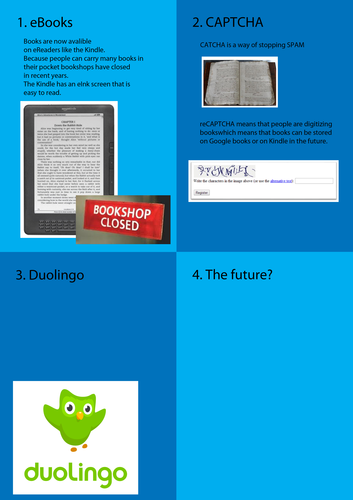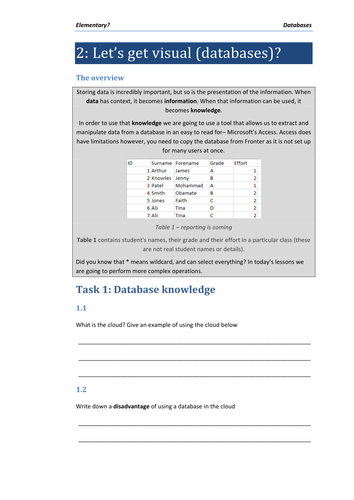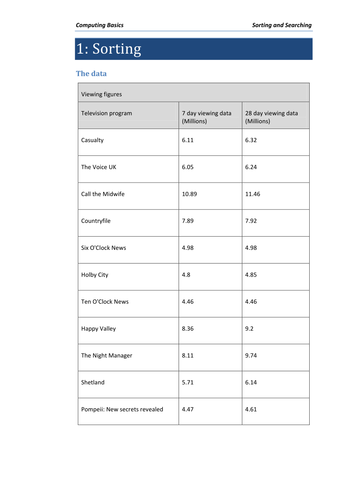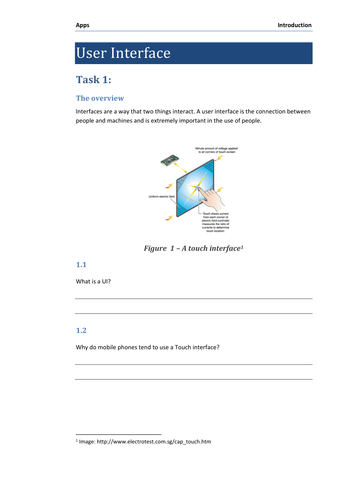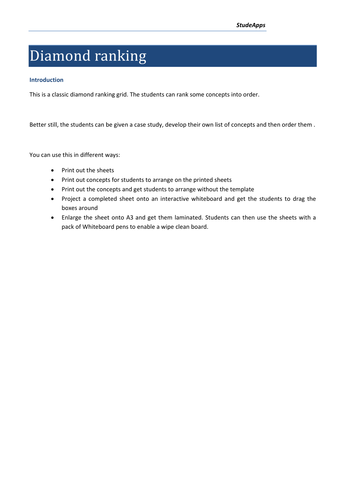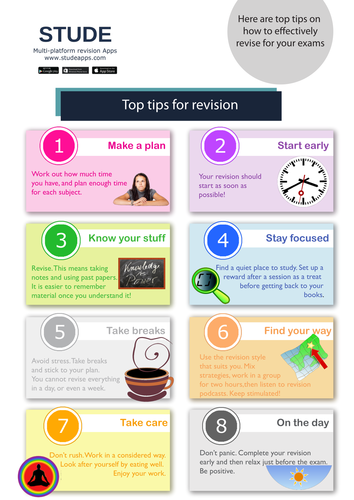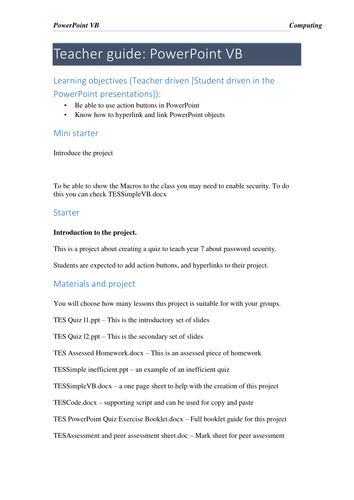
546Uploads
227k+Views
80k+Downloads
Computing

Artificial Intelligence Computer Science Scheme of work for KS3
Covers Ai for Key Stage Three.
Lesson 1 - What are the limits of computing?
Lesson 2 - Why do we need humans to do work (how Captcha works)
Lesson 3 - Plagiarism and your own work
Complete with worksheets, presentations and answer sheets.

Abstraction Computing Lesson for KS3
Two different ways of teaching abstraction to a Key Stage 3 audience.
One way is by using logos and Photoshop (Abstraction and Logo Design).
The other included way is by creating a model in Microsoft Excel (Abstractionmodel).
Both very successful lessons to explain this important concept.

micro:bit (microbit) three lesson KS3 Scheme of work (SoW)
Three lesson scheme of work for KS3 including worksheet and explainations!
Each lesson has video support

Pokémon GO eSafety lesson for KS3
Lesson around Pokémon GO that talks about the eSafety issues that need to be addressed. This includes paying money in seemingly free to play games, the consequences of thinking other players are safe and how lures work within the game.

Pokémon GO Mobile input devices Computing lesson for KS3
Students learn about how installing Apps onto mobile phones needs some consideration.
Learning objectives:
o Understand the input devices that a mobile phone can use
The narrative flow of the lesson follows the following:
• Pokémon uses GPS to understand the user's location
• GPS can also plot time
• Augmented reality means that we plot computer items onto the real world
• But are there risks associated with this

Pokémon GO Viruses, Malware Computing lesson for KS3 and KS4
Students learn about how installing Apps onto mobile phones needs some consideration.
Learning objectives:
o Be aware that Apps from alternative sources may not be safe
o Understand that you exchange some element of privacy in exchange for using Apps on a phone
The narrative flow of the lesson follows the following:
• How malware is installed on computers
• How malware is social engineering - making people install Pokémon go from other sources is dangerous
• Pokémon Go is actually known as malware for some people!
• Pokémon Go was just the type of App that people were excited to get they would take risks for: but was this worth it?

AppInventor Computing Programming Scheme of work for KS3
Full scheme of work including video tutorials for each section.
5 lessons including Assessment sheet. This resource has 23 separate files, all the preparation is done so pretty much all you have to do is check it over and go!
Includes all resources and potential exam questions that can be set for homework or for a test.

Google skills for KS3
Two lessons for KS3 around improving Google skills.
Can be used as cover lessons, or to help you expand student's knowledge of the world's most popular search engine.

micro:bit sequencing lesson
Full lesson about sequencing for microbits. Aimed at year 7, where they code a namebadge and a scissors paper stone game.
The coding tasks have pre prepared videos on Youtube for you to share and use, as well as a tutorial guide.
This uses the blocks mode and the emulator, no need to use the actual hardware.

Computing Algorithms Artificial Intelligence, AI and Crowd Sourcing Lesson for KS3
A single lesson to help students understand crowd sourcing.
We are increasingly using artificial intelligence for simple tasks in the business world. Google use algorithms to digitize books. However there is something quite sinister in the way that Google are using the Crowd to work for them, often with the workers unaware that they are working for a large multinational firm.
This lesson is fully resourced and has a complete teacher’s guide. (L2Answers.docx)
There is a full lesson (L2AI2016edc.docx), and a shortened poster lesson (L2AI2016dc.docx)

Databases full Scheme of work for KS3
Lessons plus video support.
Simply the best way to teach students relational databases.

Algorithms sorting and searching (inc. Bubble sort) for KS3 and KS4
Worksheet is used for comparing algorithms.
This is a very good introduction featuring links to online resources, and is a great way for the students to be active while learning this important set of concepts.

User Interfaces for Computing (KS3 or KS4)
A session to teach students about user interfaces. Suitable for KS3 or KS4, and has an activity where they think about the features of a UI that will be suitable for a children's tablet.

Diamond Ranking Grid
This is a classic diamond ranking grid. The students can rank some concepts into order.
Better still, the students can be given a case study, develop their own list of concepts and then order them .
You can use this in different ways:
• Print out the sheets
• Print out concepts for students to arrange on the printed sheets
• Print out the concepts and get students to arrange without the template
• Project a completed sheet onto an interactive whiteboard and get the students to drag the boxes around
• Enlarge the sheet onto A3 and get them laminated. Students can then use the sheets with a pack of Whiteboard pens to enable a wipe clean board.

Visual Basic (VB) using PowerPoint for KS3 Computing
A project for Microsoft PowerPoint that teaches Visual Basic by allowing students to create an interactive quiz.
A great hit with students and teachers alike!
Full project including assessed homework, assessment sheet and full guide.

End of Year Computing Quiz - 2016
A quiz for the class for the end of summer term 2016. Can be used from year 7 to 11, but aligns with the KS3 national curriculum.
Either run with one answer sheet per pupil or put the students into teams.

Recursion and Recursive techniques in computing and computer science
A great lesson around how to teach recursion away from the computer.
Based around a flood fill recursive technique, and also includes an exercise to teach shortest network path (with in the teacher notes). The worksheets are available for your use, and contain answers to the programming challenges in Java, Python and Pascal.
Backed by the following post (free forever) https://studeappsblog.medium.com/recursion-what-is-it-b4e9093db4c4
This could be used for an A level or GCSE classes and can be used with a high ability KS3 class.

Lists and pointers for AS and A2 Computing
Resources for teaching abstract datatyles (lists) that also leads easily to pointers.
Developed for A level Computing specification.
Not tied to any particular programming language.

Hardware devices for As Computing
Presentation and activity for 3.2.4 Hardware Devices for the specification AQA 2510.
May be suitable for other specifications.

